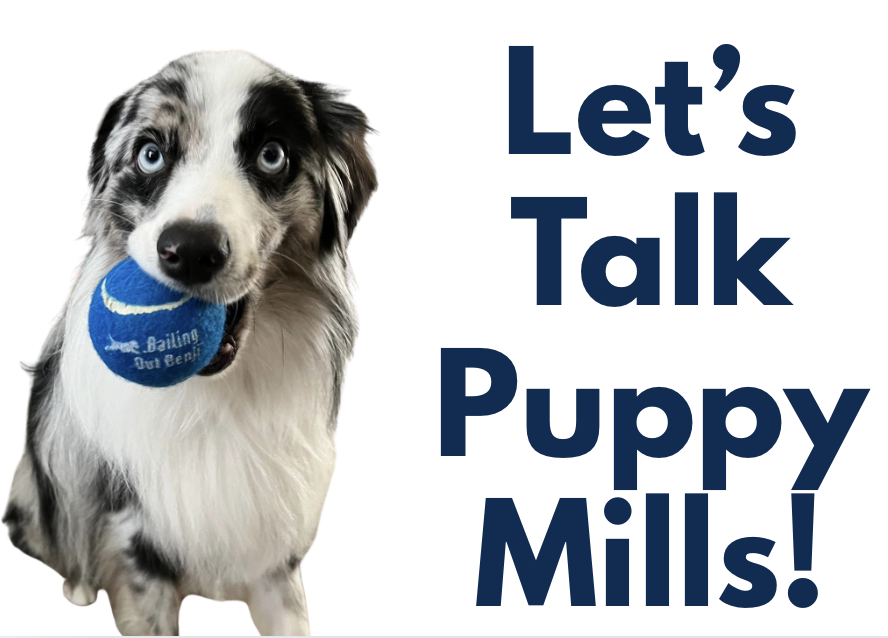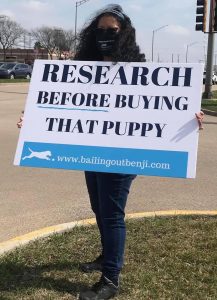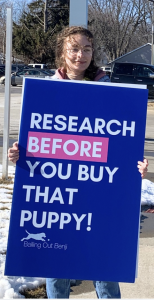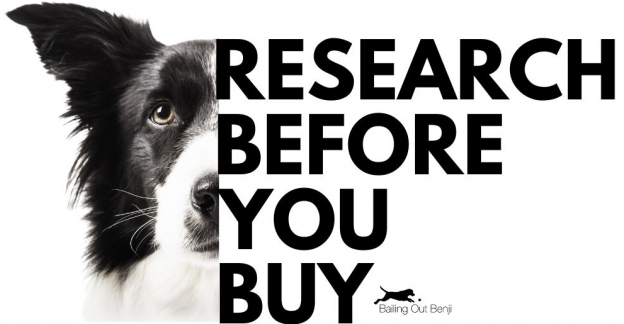
There is a lot of information- and misinformation- out there surrounding the puppy mill industry and it is coming from all over the place. The sellers themselves provide an alarming lack of transparency, and advocates are often using outdated information because of lack of access.
In an attempt to course-correct in order to help both consumers and advocates have some clearer answers, we have listed out some of the most common myths and false-facts we’ve seen out there regarding puppy mills.
We are going to warn you though, nothing is as black and white as we want it to be.

“There are approximately 10,000 puppy mills in operation across the United States.”
Our answer: This approximation isn’t accurate.
As far as we can tell, this number has been circulated since 2015 and is based on a lot of assumptions. This number works based on the theory that every USDA licensed breeder in operation is a puppy mill and then rounds up to 10,000 in order to factor for state licensed and unlicensed facilities.
What is the real answer then? Unfortunately, there isn’t a clear answer for that. What we can tell you is that there are tens of thousands of unlicensed breeders selling through online brokering sites, social media, and through dog brokering facilities. Our organization monitors those and tracks their breeds sold in order to determine if a licensing complaint needs to be filed.
When it comes to the licensed facilities we are monitoring, 39% of those have had violations on the state or federal level in the last 5 years. *Please note: These statistics change regularly due to our ability to include more data. As we continue auditing state and federal inspections, that number will continue to fluctuate.
For more information on facilities with severe violations, you can also view our USDA inspection audits here.
“Puppy mills are USDA licensed!” or “Puppy mills are unlicensed and unregulated!”
Our answer: Both are true and both are false.
Many commercial dog breeders, including puppy mills, are USDA or state licensed, but that doesn’t mean they meet high standards of care. The USDA sets only minimal requirements for housing, food, water, and veterinary care, and those standards that still allow for dogs to live in small cages for years with little to no human interaction. A good thing to keep in mind: you know a lot of people with a driver’s license, but not all of them are people you want to jump in a car with.
Each quarter we audit a list of USDA licensees that receive direct or critical violations, warnings, and fines. For more information on facilities with severe violations, you can also view our USDA inspection audits here.
On the other hand, there are also unlicensed and unregulated puppy mills operating illegally, especially those that sell directly to the public through brokers, online ads, or social media. Those facilities operate without any oversight and, because of that, are not bound by state or federal regulations.
It is important for every puppy-buyer to do their research before they exchange any money or sign any contracts. View our tips on finding a humane breeder here.
“The puppies come with AKC or APR papers, they must be coming from a good place.”
Our answer: This statement isn’t true.
While AKC (American Kennel Club) or APR (America’s Pet Registry) registration papers might sound official, they only confirm the puppy’s breed lineage. They do not reflect the quality of care the animals receive. These registries do not inspect breeding facilities or ensure humane treatment of dogs. In fact, many puppy mills and substandard breeders can, and do, sell puppies with these papers to give a false sense of legitimacy.
Registration alone is not a guarantee of responsible breeding, health, or ethical practices. Customers must do their research before they buy.
View our tips on finding a humane breeder here.
“Puppies sold online and in pet stores come from puppy mills.”
Our answer: Yes… and no.
Puppy mills and subpar breeding facilities sell everywhere. They are selling in stores and online, through newspaper ads and TikTok lives. We are seeing customers getting scammed every single day through their purchases because the breeder was inhumane, had severe violations, didn’t genetically test, or straight up didn’t exist. Puppy mills and scammers are using every avenue available in order to sell their animals.
However. Not every breeder that sells online or through a pet store runs an inhumane operation. Through the data we have been able to collect, 23% of the licensed breeders selling to pet stores in the last 3 years have had state or federal violations within the last 5 years. Subsequently, 38% of the breeders that are currently selling through online brokering sites have had violations in the last 5 years. *Please note: These statistics change regularly due to our ability to include more data. As we continue researching stores and websites, that number will continue to fluctuate.
Through our field research, we have personally visited some of the facilities that sell through third parties and have seen those conditions. Because of that, we can not ethically say that every breeder selling in pet stores or online are puppy mills as a hard and fast statement. It is crucial that consumers do their research before they buy and confirm all breeder information for themselves.
To view our research into puppy-stores, websites, brokers, and unethical rescues, click here.

“Sick puppies don’t sell, so puppy mills couldn’t possibly sell sick puppies.”
Our answer: This statement is false.
While most breeders know that obviously ill puppies won’t attract buyers, many health issues, especially genetic diseases or congenital defects, aren’t visible at the time of sale. Puppies from subpar breeding operations are often bred without regard for genetic health or proper socialization, increasing the risk of conditions like hip dysplasia, heart problems, epilepsy, or behavioral issues that may not show up until months or even years later. Some puppies do become visibly sick shortly after going home due to stress, overcrowding, or lack of proper veterinary care early in life. Just because a puppy looks healthy when you meet them doesn’t mean they were bred responsibly or will stay healthy.
At Bailing Out Benji, we help hundreds of customers each year file complaints and navigate the process after buying a sick or deceased puppy. We hope that someday we are able to reach families before they unknowingly support an unethical facility, but for now we will make sure their stories are heard by the proper agencies.
“Amish dog breeders are cruel and inhumane”
Our answer: This belief is inherently false.
This stereotype is false because it unfairly generalizes an entire community based on the actions of some individuals. While it is true that some dog breeders in Amish communities have operated puppy mills with poor conditions, not all Amish breeders treat their animals inhumanely. Cruelty and neglect in dog breeding can occur in any community, regardless of religion or culture. What matters is the breeder’s practices, not their background. It’s important to judge each breeder individually based on transparency, animal care standards, and willingness to let buyers see where the puppies are raised, rather than making assumptions based on stereotypes.
Through our field research, we have been able to meet many Amish and Mennonite families that participate in dog breeding. The families that we have been able to meet have been extremely kind and have taken the steps to have some of the best kennels we have seen.
To read more about our experience, click here.
“It is unethical to buy a dog.” or “Adopt Don’t Shop.”
Our answer: We believe these statements aren’t helpful, but not everyone will share this opinion.
While it is true that shelters and rescues are overflowing across the country and those animals deserve homes, it is equally as true that not every family in our country will choose to adopt or would even be approved to adopt.
As advocates, it is up to each of us to help make sure that families do not support cruel and inhumane breeding operations. We have to be the ones who offer advice on how to find a humane breeder, while still leaving the option to adopt there. If we can stop families from giving their money to puppy mill operations, they will cease to exist.
Alternatively, families who take the time to find a humane breeder should encounter less health issues with their puppy and have more support for training issues, which could result in fewer dogs being surrendered to sheltering organizations. View our tips on finding a humane breeder here.
In addition, it is equally as important for families to look into the rescue organizations they are adopting from. There are many operations out there that are participate in predatory practices and also source from questionable facilities as well. You can view our opinion on that issue here.
“Once a horrible puppy mill, always a horrible puppy mill!”
Our answer: We don’t believe this is true.
At Bailing Out Benji, we believe that people can change. We believe that if we are able to have a conversation with a consumer, they will want to do more research and make sure they don’t support a puppy mill. We have seen that commercial dog breeders can choose to do better when presented with the education and support to do so. We also believe that a bad inspection history doesn’t always mean a facility is a puppy mill.
When we are monitoring licensed facilities across the country, we only focus on violations that occurred within the last 5 years. Anything beyond that we consider to be outdated information.
Misinformation is one of the puppy mill industry’s most powerful tools.
Because of outdated statistics and misleading language used by pet stores and online sellers, the public is often unknowingly tricked into supporting cruelty. Meanwhile, advocates that are using outdated or false information are tricked into supporting efforts that aren’t as effective as they believe.
When stores and websites use phrases like “USDA licensed,” “family-raised,” or “hobby breeder”, it is designed to sound ethical, even when they hide inhumane conditions. And when advocates spread the myth that there are only 10,000 puppy mills, it drastically downplays the scale of the problem, while flashy websites and false guarantees create a dangerous illusion of legitimacy.
Without accurate, transparent information, well-meaning families continue to fund puppy mills, even when they believe they are doing the right thing.
At Bailing Out Benji you can trust that we will share the most current and accurate data that we have access to, in order to make a difference for dogs and families everywhere.


